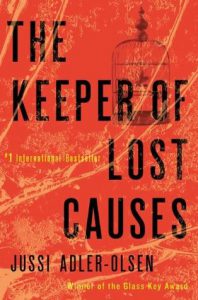 The Nebraska Publications Clearinghouse receives documents every month from all Nebraska state agencies, including the University of Nebraska Press (UNP). Beginning today, and each month as we receive them, we will be showcasing the UNP books that the Clearinghouse receives. The UNP books, as well as all Nebraska state documents, are available for checkout by libraries and librarians in Nebraska.
The Nebraska Publications Clearinghouse receives documents every month from all Nebraska state agencies, including the University of Nebraska Press (UNP). Beginning today, and each month as we receive them, we will be showcasing the UNP books that the Clearinghouse receives. The UNP books, as well as all Nebraska state documents, are available for checkout by libraries and librarians in Nebraska.
Here are UNP books the Clearinghouse received in January:
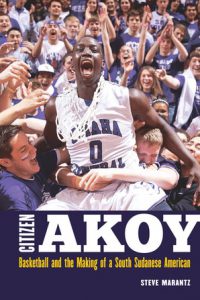 Citizen Akoy: Basketball and the Making of a South Sudanese American
Citizen Akoy: Basketball and the Making of a South Sudanese American
Akoy Agau led Omaha Central High School to four straight high school basketball state championships (2010–13) and was a three‑time All‑State player. One of the most successful high school athletes in Nebraska’s history, he’s also a South Sudanese refugee. At age four, Akoy and his family fled Sudan during the Second Sudanese Civil War, and after three years in Cairo, they came to Maryland as refugees. They arrived in Omaha in 2003 in search of a better future. In a fluid, intimate, and joyful narrative, Steve Marantz relates Akoy’s refugee journey of basketball, family, romance, social media, and coming of age at Nebraska’s oldest and most diverse high school. Set against a backdrop of the South Sudanese refugee community in Omaha, Marantz provides a compelling account of the power of sports to blend cultures in the unlikeliest of places.
Come Fly with Us: NASA’s Payload Specialist Program (Series: Outward 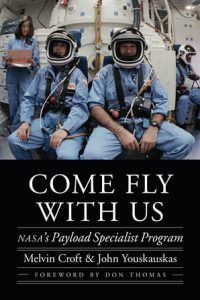 Odyssey: A People’s History of Spaceflight)
Odyssey: A People’s History of Spaceflight)
Come Fly with Us is the story of an elite group of space travelers who flew as members of many space shuttle crews from pre-Challenger days to Columbia in 2003. Not part of the regular NASA astronaut corps, these professionals known as “payload specialists” came from a wide variety of backgrounds and were chosen for an equally wide variety of scientific, political, and national security reasons. Melvin Croft and John Youskauskas focus on this special fraternity of spacefarers and their individual reflections on living and working in space. Relatively unknown to the public and often flying only single missions, these payload specialists give the reader an unusual perspective on the experience of human spaceflight. The authors also bring to light NASA’s struggle to integrate the wide-ranging personalities and professions of these men and women into the professional astronaut ranks.
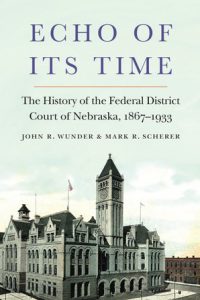 Echo of Its Time: The History of the Federal District Court of Nebraska, 1867-1933
Echo of Its Time: The History of the Federal District Court of Nebraska, 1867-1933
Throughout its existence the Federal District Court of Nebraska has echoed the dynamics of its time, reflecting the concerns, interests, and passions of the people who have made this state their home. Echo of Its Time explores the court’s development, from its inception in 1867 through 1933, tracing the careers of its first four judges: Elmer Dundy, William Munger, Thomas Munger (no relation), and Joseph Woodrough, whose rulings addressed an array of issues and controversies echoing macro-level developments within the state, nation, and world. Echo of Its Time both informs and entertains while using the court’s operations as a unique and accessible prism through which to explore broader themes in the history of the state and the nation. The book explores the inner workings of the court through Thomas Munger’s personal correspondence, as well as the court’s origins and growing influence under the direction of its legendary first judge, Elmer Dundy. Dundy handled many notable and controversial matters and made significant decisions in the field of Native American law, including Standing Bear v. Crook and Elk v. Wilkins. From the turn of the century through 1933 the court’s docket reflected the dramatic and rapid changes in state, regional, and national dynamics, including labor disputes and violence, political corruption and Progressive Era reform efforts, conflicts between cattle ranchers and homesteaders, wartime sedition and “slacker” prosecutions, criminal enterprises, and the endless battles between government agents and bootleggers during Prohibition.
Hearing Voices: Aurality and New Spanish Sound Culture in Sor Juana Inés 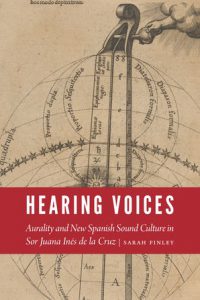 de la Cruz (Series: New Hispanisms)
de la Cruz (Series: New Hispanisms)
Hearing Voices takes a fresh look at sound in the poetry and prose of colonial Latin American poet and nun Sor Juana Inés de la Cruz (1648/51–95). A voracious autodidact, Sor Juana engaged with early modern music culture in a way that resonates deeply in her writing. Despite the privileging of harmony within Sor Juana’s work, however, links between the poet’s musical inheritance and subjects such as acoustics, cognition, writing, and visual art have remained unexplored. These lacunae have marginalized nonmusical aurality and contributed to the persistence of both ocularcentrism and a corresponding visual dominance in scholarship on Sor Juana—and indeed in early modern cultural production in general. Hearing Voices focuses on these aural conceits in highlighting the importance of sound and—in most cases—its relationship with gender in Sor Juana’s work and early modern culture. Sarah Finley explores attitudes toward women’s voices and music making; intersections of music, rhetoric, and painting; aurality in Baroque visual art; sound and ritual; and the connections between optics and acoustics. Finley demonstrates how Sor Juana’s striking aurality challenges ocularcentric interpretations and problematizes paradigms that pin vision to logos, writing, and other empirical models that traditionally favor men’s voices. Sound becomes a vehicle for women’s agency and responds to anxiety about the female voice, particularly in early modern convent culture.
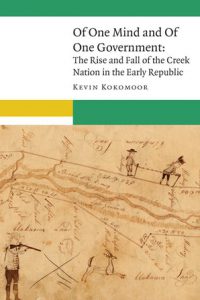 Of One Mind and Of One Government: The Rise and Fall of the Creek Nation in the Early Republic (Series: Early American Places, and, New Visions in Native American and Indigenous Studies)
Of One Mind and Of One Government: The Rise and Fall of the Creek Nation in the Early Republic (Series: Early American Places, and, New Visions in Native American and Indigenous Studies)
In Of One Mind and Of One Government Kevin Kokomoor examines the formation of Creek politics and nationalism from the 1770s through the Red Stick War, when the aftermath of the American Revolution and the beginnings of American expansionism precipitated a crisis in Creek country. The state of Georgia insisted that the Creeks sign three treaties to cede tribal lands. The Creeks objected vigorously, igniting a series of border conflicts that escalated throughout the late eighteenth century and hardened partisan lines between pro-American, pro-Spanish, and pro-British Creeks and their leaders. Creek politics shifted several times through historical contingencies, self-interests, changing leadership, and debate about how to best preserve sovereignty, a process that generated national sentiment within the nascent and imperfect Creek Nation.
Based on original archival research and a revisionist interpretation, Kokomoor explores how the state of Georgia’s increasingly belligerent and often fraudulent land acquisitions forced the Creeks into framing a centralized government, appointing heads of state, and assuming the political and administrative functions of a nation-state. Prior interpretations have viewed the Creeks as a loose confederation of towns, but the formation of the Creek Nation brought predictability, stability, and reduced military violence in its domain during the era.
One Size Fits None: A Farm Girl’s Search for the Promise of Regenerative  Agriculture
Agriculture
“Sustainable” has long been the rallying cry of agricultural progressives; given that much of our nation’s farm and ranch land is already degraded, however, sustainable agriculture often means maintaining a less-than-ideal status quo. Industrial agriculture has also co-opted the term for marketing purposes without implementing better practices. Stephanie Anderson argues that in order to provide nutrient-rich food and fight climate change, we need to move beyond sustainable to regenerative agriculture, a practice that is highly tailored to local environments and renews resources. In One Size Fits None Anderson follows diverse farmers across the United States: a South Dakota bison rancher who provides an alternative to the industrial feedlot; an organic vegetable farmer in Florida who harvests microgreens; a New Mexico super-small farmer who revitalizes communities; and a North Dakota midsize farmer who combines livestock and grain farming to convert expensive farmland back to native prairie. The use of these nontraditional agricultural techniques show how varied operations can give back to the earth rather than degrade it. This book will resonate with anyone concerned about the future of food in America, providing guidance for creating a better, regenerative agricultural future.
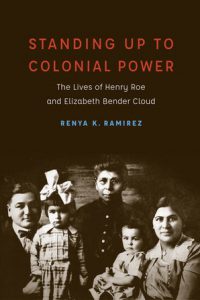 Standing Up to Colonial Power: The Lives of Henry Roe and Elizabeth Bender Cloud (Series: New Visions in Native American and Indigenous Studies)
Standing Up to Colonial Power: The Lives of Henry Roe and Elizabeth Bender Cloud (Series: New Visions in Native American and Indigenous Studies)
Standing Up to Colonial Power focuses on the lives, activism, and intellectual contributions of Henry Cloud (1884–1950), a Ho-Chunk, and Elizabeth Bender Cloud (1887–1965), an Ojibwe, both of whom grew up amid settler colonialism that attempted to break their connection to Native land, treaty rights, and tribal identities. Mastering ways of behaving and speaking in different social settings and to divergent audiences, including other Natives, white missionaries, and Bureau of Indian Affairs officials, Elizabeth and Henry relied on flexible and fluid notions of gender, identity, culture, community, and belonging as they traveled Indian Country and within white environments to fight for Native rights. Elizabeth fought against termination as part of her role in the National Congress of American Indians and General Federation of Women’s Clubs, while Henry was one of the most important Native policy makers of the early twentieth century. He documented the horrible abuse within the federal boarding schools and co-wrote the Meriam Report of 1928, which laid the foundation for the Indian Reorganization Act of 1934. Together they ran an early college preparatory Christian high school, the American Indian Institute. Standing Up to Colonial Power shows how the Clouds combined Native warrior and modern identities as a creative strategy to challenge settler colonialism, to become full members of the U.S. nation-state, and to fight for tribal sovereignty. Renya K. Ramirez uses her dual position as a scholar and as the granddaughter of Elizabeth and Henry Cloud to weave together this ethnography and family-tribal history.
Words Like Birds: Sakha Language Discourses and Practices in the City 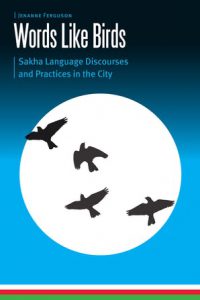 (Series: Borderlands and Transcultural Studies)
(Series: Borderlands and Transcultural Studies)
What does it mean to speak Sakha in the city? Words Like Birds, a linguistic ethnography of Sakha discourses and practices in urban far eastern Russia, examines the factors that have aided speakers in maintaining—and adapting—their minority language over the course of four hundred years of contact with Russian speakers and the federal power apparatus. Words Like Birds analyzes modern Sakha linguistic sensibilities and practices in the urban space of Yakutsk. Sakha is a north Siberian Turkic language spoken primarily in the Sakha Republic (Yakutia) in the northeastern Russian Federation. For Sakha speakers, Russian colonization in the region inaugurated a tumultuous history in which their language was at times officially supported and promoted and at other times repressed and discouraged. Jenanne Ferguson explores the communicative norms that arose in response to the top-down promotion of the Russian language in the public sphere and reveals how Sakha ways of speaking became emplaced in villages and the city’s private spheres. Focusing on the language ideologies and practices of urban bilingual Sakha-Russian speakers, Ferguson illuminates the changes that have taken place in the first two post-Soviet decades, in contexts where Russian speech and communicative norms dominated during the Soviet era. Weaving together three major themes—language ideologies and ontologies, language trajectories, and linguistic syncretism—this study reveals how Sakha speakers transform and adapt their beliefs, evaluations, and practices to revalorize a language, maintain and create a sense of belonging, and make their words heard in Sakha again in many domains of city life. Like the moveable spirited words, the focus of Words Like Birds is mobility, change, and flow, the tracing of the situation of bilinguals in Yakutsk.
Pictures and synopses courtesy of University of Nebraska Press.
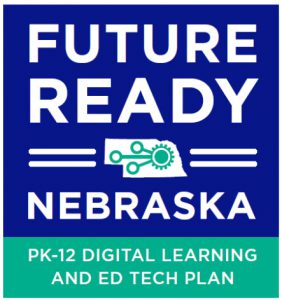 The Future Ready Nebraska Council has just released Nebraska’s first ever Statewide Digital Learning and Ed Tech Plan. Come learn more about the plan and how you can be a part of the Future Ready Nebraska Librarians work group. There is much work to be done in the next 3 years. You will learn more about the work that Nebraska Librarians can advise and participate in as we move Nebraska forward in the Future Ready work. This work will help make Librarians across the state a great resource for their districts in preparing their schools to be Future Ready.
The Future Ready Nebraska Council has just released Nebraska’s first ever Statewide Digital Learning and Ed Tech Plan. Come learn more about the plan and how you can be a part of the Future Ready Nebraska Librarians work group. There is much work to be done in the next 3 years. You will learn more about the work that Nebraska Librarians can advise and participate in as we move Nebraska forward in the Future Ready work. This work will help make Librarians across the state a great resource for their districts in preparing their schools to be Future Ready. Upcoming NCompass Live events:
Upcoming NCompass Live events: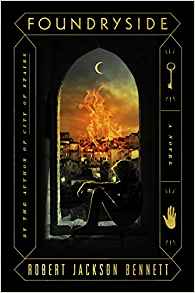
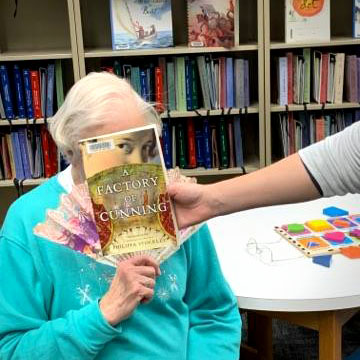
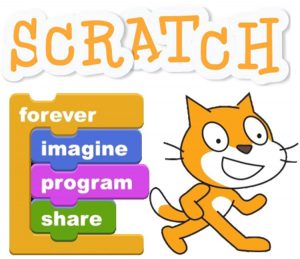
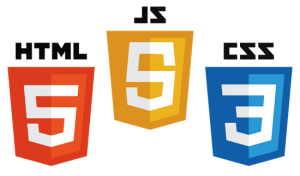
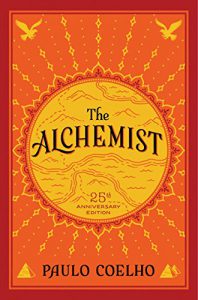

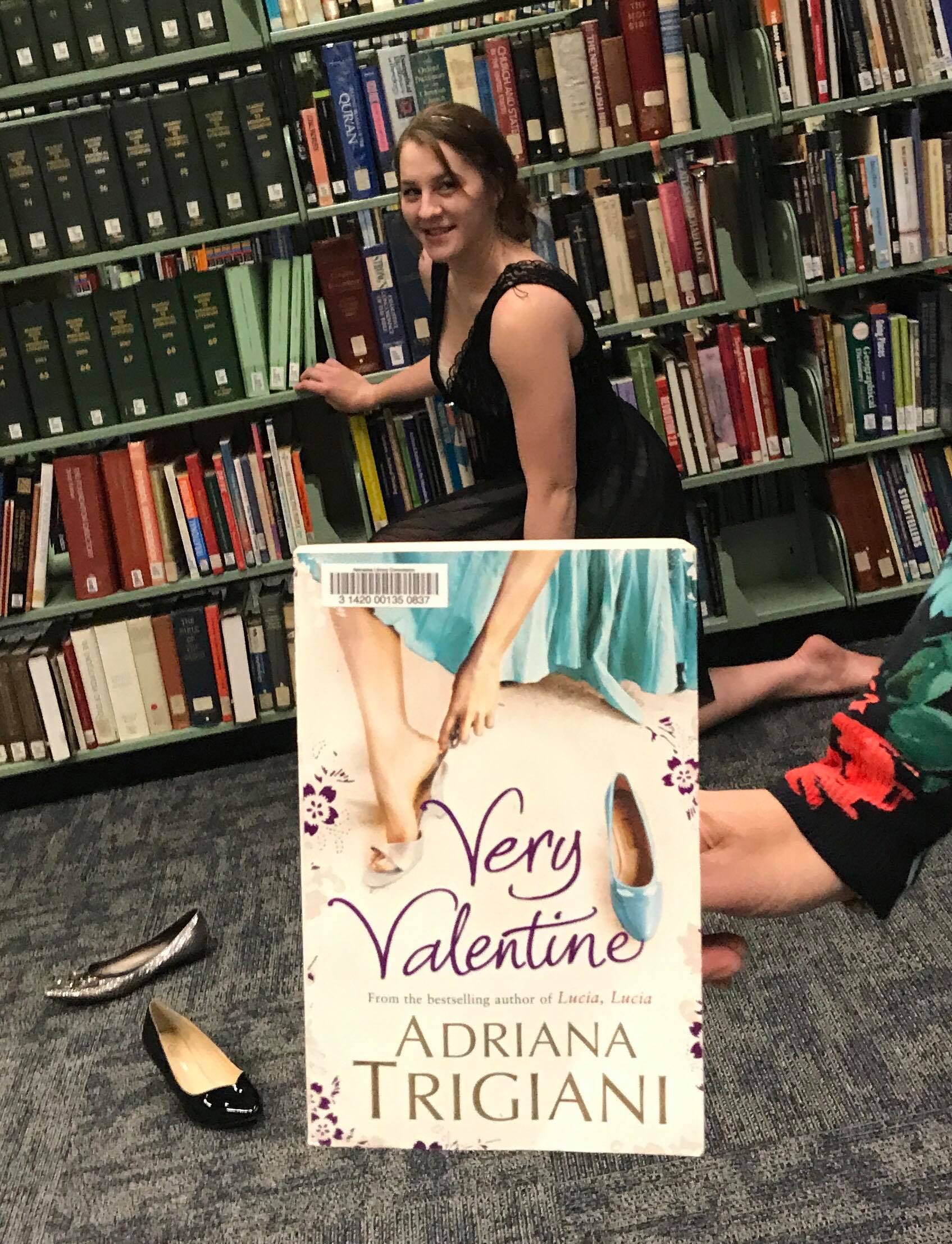
 Just a reminder …. Wednesday, February 27 is the deadline to submit the first form in the E-rate process, Form 470, for the upcoming 2019 Funding Year.
Just a reminder …. Wednesday, February 27 is the deadline to submit the first form in the E-rate process, Form 470, for the upcoming 2019 Funding Year.

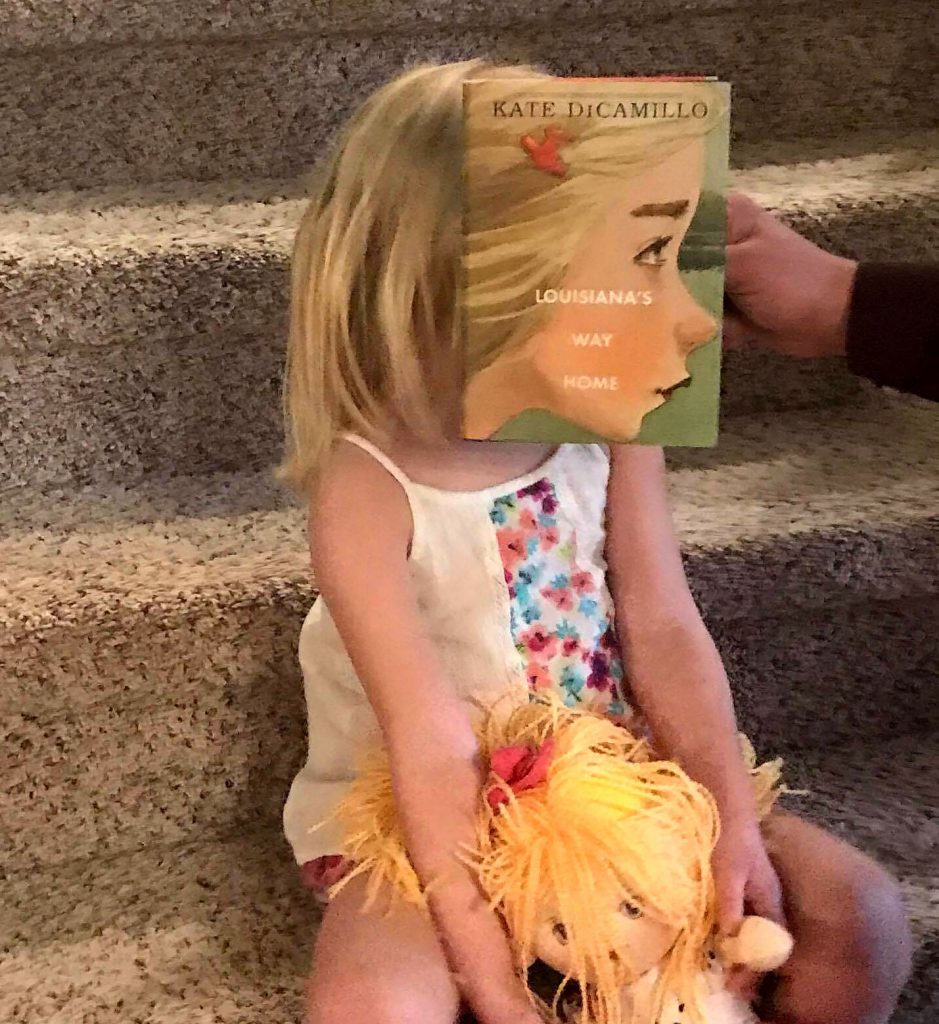
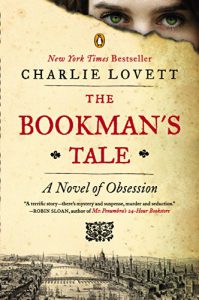 Mystery fiction has many subgenres: hard-boiled, cozy, police procedural, etc. One particular subgenre of interest to lovers of books is that of the bibliomystery, and in recent years, I’ve found that I love to read, or listen to, books that fall in this bibliomystery category. If you do an online search you will find many authors that write bibliomysteries. My favorites are John Dunning’s
Mystery fiction has many subgenres: hard-boiled, cozy, police procedural, etc. One particular subgenre of interest to lovers of books is that of the bibliomystery, and in recent years, I’ve found that I love to read, or listen to, books that fall in this bibliomystery category. If you do an online search you will find many authors that write bibliomysteries. My favorites are John Dunning’s 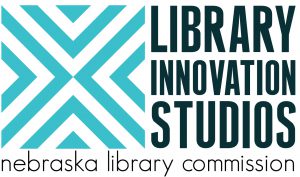

 The
The  Citizen Akoy: Basketball and the Making of a South Sudanese American
Citizen Akoy: Basketball and the Making of a South Sudanese American Odyssey: A People’s History of Spaceflight)
Odyssey: A People’s History of Spaceflight)  Echo of Its Time: The History of the Federal District Court of Nebraska, 1867-1933
Echo of Its Time: The History of the Federal District Court of Nebraska, 1867-1933 de la Cruz (Series: New Hispanisms)
de la Cruz (Series: New Hispanisms) Of One Mind and Of One Government: The Rise and Fall of the Creek Nation in the Early Republic (Series: Early American Places, and, New Visions in Native American and Indigenous Studies)
Of One Mind and Of One Government: The Rise and Fall of the Creek Nation in the Early Republic (Series: Early American Places, and, New Visions in Native American and Indigenous Studies) Agriculture
Agriculture  Standing Up to Colonial Power: The Lives of Henry Roe and Elizabeth Bender Cloud (Series: New Visions in Native American and Indigenous Studies)
Standing Up to Colonial Power: The Lives of Henry Roe and Elizabeth Bender Cloud (Series: New Visions in Native American and Indigenous Studies) (Series: Borderlands and Transcultural Studies)
(Series: Borderlands and Transcultural Studies)
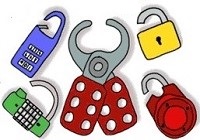 Join us for the next FREE NCompass Live webinar, ‘You Make Me Want To Break Out’ on Wednesday, February 6, 10:00am – 11:00am CT.
Join us for the next FREE NCompass Live webinar, ‘You Make Me Want To Break Out’ on Wednesday, February 6, 10:00am – 11:00am CT.